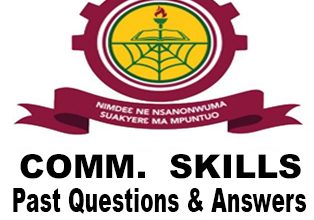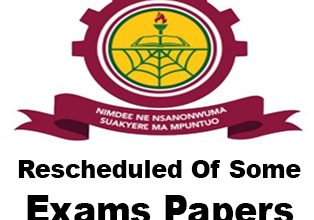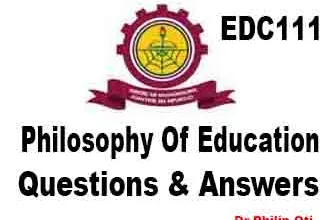AAMUSTED
Summary of Philosophy Of Education (Chapter Two 7 & 8)
Aamusted Philosophy of Education EDC 111
CHAPTER SEVEN
IMPORTANT CONCEPTS IN PHILOSOPHY OF EDUCATION
- IMPORTANT CONCEPTS IN PHILOSOPHY OF EDUCATION
- Democracy
- Freedom
- Morality
- Authority
- Discipline
Recommended
Summary of Philosophy Of Education (Chapter One 1)
Summary of Philosophy Of Education (Chapter Two 2 & 3)
Summary of Philosophy Of Education (Chapter Two 4)
Summary of Philosophy Of Education (Chapter Two 5)
Summary of Philosophy Of Education (Chapter Two 6)
Summary of Philosophy Of Education (Chapter Two 7 & 8)
Democracy
- One objective of education is the production of what could be described as “Democratic Man”
- Men who are highly tolerant, accommodating, and open-minded.
- This could be interpreted in three main ways:
- First, education should serve the purpose of democracy by producing citizens able and willing to maintain a democratic society.
- Secondly, schools and other educational institutions should themselves be organized in democratic lines.
- Thirdly, Education to a large extent is accountable to the society that provides it.
- The type of democracy appropriate is the one which allows children (students) participate in the democratic procedures under conditions in which they can do themselves little harm.
Freedom
- To Schofield (1972) freedom may be defined as the absence of restraint in life.
- That is, it is a situation whereby one is able to act or do what he/she likes without restriction from any person, authority or condition.
- In order words, there is freedom when an individual is under no obligation to act contrary to his wishes.
- Freedoms in the school situation for children,
- Freedom of speech
- Freedom of Association
- Freedom from imposition of ideas, restrictions punishment etc.
- Freedom to choose subjects, friends, and to go to classes or not.
- Freedom from fear and unnecessary anxiety.
Freedom
- Do Teachers also have Freedom?
- Teachers have freedom to choose teaching methods
- Freedom to participate in decision making
- Freedom to put into practice a worthy philosophy of teaching
- Do parents also have Freedom?
- Freedom to pay for education in independent schools
- Parents have freedom to choose denominational schools
- Freedom to guide children to choose programmes
Freedom
- In school, Freedom is desirable because particularly, with children, when fear is present, they do not show their natural behavior and interest.
- Teachers and authorities should therefore refrain from any act that will prevent the child from exercising his freedom.
- However, as much as freedom is desired, it cannot be exercised without some limitations.
- Unlimited freedom may bring about chaos, hence in the school, even though learners should be allowed to develop and work with a great degree of freedom, there should be a limit to their freedom to enable each student to feel his right of freedom.
Authority
- Authority is the power or right to act. E.g. to compel people to conform.
- Authority is important because freedom without authority is license to produce anarchy.
- Freedom is sustained by willing submission to genuine authority whether man, institutional or administrative.
- Authority guides or limits the individual to exercise and enjoy his freedom more responsibly.
- In the school, those with authority are the head teacher, teachers and to some extent the prefects.
- The head teacher has authority over everyone in the school. The teachers are the subordinates of the head.
- The teachers also have authority over the students in the classroom.
Types of Authority
- Traditional authority It is the kind of authority given to a person because of traditionally transmitted rules or beliefs. An example is the authority of the chief.
- Legal-rational Authority It is the kind of authority which is imposed on someone by law or formally established procedures.
- With this type of authority, obedience is not owed to the person but to the position he occupies.
- Charismatic authority The exercise of such authority is based on the attractiveness and appeal of the leader. When a person is able to command respect and obedience from his/her followers because of his charming and loving personality.
Recommended
Summary of Philosophy Of Education (Chapter One 1)
Summary of Philosophy Of Education (Chapter Two 2 & 3)
Summary of Philosophy Of Education (Chapter Two 4)
Summary of Philosophy Of Education (Chapter Two 5)
Summary of Philosophy Of Education (Chapter Two 6)
Summary of Philosophy Of Education (Chapter Two 7 & 8)
Morality
- Morality concerns with deciding on the rightness or wrongness of an action.
- Moral situation arises when one has the opportunity to decide on the rightness or otherwise of one’s action in terms of standard or criteria.
- In education, morality is one of the powers that compel people to conform.
- Teachers have certain ethics, we normally refer to as the code of ethics that regulate their professional conduct.
- Any act that contravenes the code of ethics may be regarded as immoral.
Discipline and Punishment
- It is a means whereby people are trained in orderliness, good conduct and the habit of getting the best of themselves.
- Discipline connotes the idea of submission to rules or some kind of order.
- Discipline is a function of freedom and authority.
- Discipline is necessary to develop the freedom of mind and spirit.
- Discipline ensures the highest freedom.
- In the school, a discipline child will obey authority or rules and regulation is likely to avoid punishment.
- Punishment by authority is needed to enforce discipline.
Types of Discipline
- Self-imposed Disciplines It is the type of discipline from within the individual which does not require the presence of external force.
- It is intrinsic. In order words, self-discipline results from an individual’s own self control as a result of his acceptance of authority. This is a true discipline.
- When a child achieves self-discipline, he does what is right and avoids wrong without any external guidance.
- Externally imposed Discipline This is the type of discipline is imposed on the child or individuals by authorities, parents, teachers, peer group etc.
- Here the acceptance of rules springs from other people’s desire and not the person’s own will.
Recommended
Summary of Philosophy Of Education (Chapter One 1)
Summary of Philosophy Of Education (Chapter Two 2 & 3)
Summary of Philosophy Of Education (Chapter Two 4)
Summary of Philosophy Of Education (Chapter Two 5)
Summary of Philosophy Of Education (Chapter Two 6)
Summary of Philosophy Of Education (Chapter Two 7 & 8)
CHAPTER EIGHT
PHILOSOPHY CHRISTIAN EDUCATION
- EDUCATIONAL PHILOSOPHIES OF THE CHRISTIAN MISSIONARIES
- The Basel
- The Wesleyans
- The Roman Catholics
- The Seventh Day Adventist
EDUCATIONAL PHILOSOPHIES OF THE CHRISTIAN MISSIONARIES
- The arrival of the Christian Missionaries saw the spread and expansion of schools in Ghana
- Their main mission was to propagate their Gospel but they realized they could effectively achieve it through the opening of schools.
- They therefore used school education as the main vehicle to achieve their goal.
- Each of the Christian missionaries organized their schools in the context of their faith until the enactment of the 1961 Education Act which sought to abolish this practice and bring some uniformity in educational provision in Ghana.
- This notwithstanding, some the Christian missions have continued to maintain distinctive aspect of their faith in their schools.
What is Christian Education?
- The aim of true education is to restore human beings into the image of God as revealed by the life of Jesus Christ.
- Only through the guidance of the Holy Spirit can this be accomplished.
- An education of this kind imparts far more than academic knowledge.
- It fosters a balanced development of the whole person—spiritual, physical, intellectual, and socio-emotional—a process that spans a lifetime. Working together, homes, schools, and churches cooperate with divine agencies to prepare learners to be good citizens in this world and for eternity.
THE BASEL MISSIONARIES AND THEIR EDUCATIONAL PHILOSOPHIES
- One philosophical foundation of the Basel Missionary education was the use of vernacular as the medium of instruction.
- Their research had proven that it was beneficial to teach in the local dialect than the foreign ones.
- The Basel mission initiated the development of Ghanaian languages into writing. E.g. Rev. Johannes Christaller, Akrofi, Rev. Zimmerman, Wester Mann.
Recommended
Summary of Philosophy Of Education (Chapter One 1)
Summary of Philosophy Of Education (Chapter Two 2 & 3)
Summary of Philosophy Of Education (Chapter Two 4)
Summary of Philosophy Of Education (Chapter Two 5)
Summary of Philosophy Of Education (Chapter Two 6)
Summary of Philosophy Of Education (Chapter Two 7 & 8)
THE BASEL MISSIONARIES….
- Another philosophical base of the Basel mission was the promotion of agricultural education.
- All Basel schools had small farms attached to them (Model Farms)
- It is not surprising that the emblem of the Presbyterian Church of Ghana is the Palm tree.
- Discipline was the hall-mark of Basel training. They did not de-couple good moral training from their educational and
THE BASEL MISSIONARIES….
- The Basel mission established the ‘Salem’ where their converts were to live away from the unbelievers.
- There was strict observance of sanitation in the Salem.
- Basel education also emphasized Technical, vocational and industrial training in areas such as carpentry, masonry, blacksmithing, bookbinding etc. in an attempt to diversify the curriculum of the castle schools.
- Tetteh Quarshie, was for instance, trained by the Basel as a Blacksmith and a “shoe-maker”.
PHILOSOPHICAL FOUNDATIONS OF THE ROMAN CATHOLIC EDUCATIONAL PRACTICES
- The Roman Catholic education centered on intellectual and purely academic courses which were aimed at total liberation of the learners from the shackles of the world.
- Subjects such as History, Religion, Philosophy and Latin were emphasized in the curriculum of the schools.
Recommended
Summary of Philosophy Of Education (Chapter One 1)
Summary of Philosophy Of Education (Chapter Two 2 & 3)
Summary of Philosophy Of Education (Chapter Two 4)
Summary of Philosophy Of Education (Chapter Two 5)
Summary of Philosophy Of Education (Chapter Two 6)
Summary of Philosophy Of Education (Chapter Two 7 & 8)
THE ROMAN CATHOLIC
- The Girl-child education was given attention by the Catholics than any other mission.
- This is manifested in the establishment of the following Girls’ secondary schools and Teacher Training Colleges;
- St Louis-Kumasi
- Notre Dame-Sunyani
- St Francis-Jirapa
- Holy Child (Cape Coast and Takoradi)
- St Rose’s
- OLA Girls (Kenyasi, Ho and Cape Coast )
- Archbishop Porter Girls
THE ROMAN CATHOLIC
- Another philosophical basis of the Catholic education was to reach out to all individuals especially the marginalized.
- They became the first Missionaries to open schools in the Northern sector and other downgraded areas in the Gold Coast.
- Idealistic and character modelling was emphasized in Catholic schools.
- Some Catholic saints were idolized and pupils were taught to emulate them, especially during baptism, pupils in Catholic schools were obliged to select a saint of their choice and model their
GENERAL PHILOSOPHY OF ADVENTIST EDUCATION
- The Seventh-day Adventist Church recognizes God as the ultimate source of existence, truth, and power.
- In the beginning, God created in His image a perfect humanity, a perfection later marred by sin.
- Education in its broadest sense is a means of returning human beings to their original relationship with God.
- The distinctive characteristics of this Adventist worldview, built around creation, the fall, redemption, and recreation, are derived from the Bible and the inspired writings of Ellen G. White.
THE SEVENTH DAY ADVENTIST PHILOSOPHY OF EDUCATION
- The distinctive characteristics of Adventist education is derived from the Bible and the writings of Ellen G. White.
- The philosophy points to the redemptive aim of true education: to restore human beings into the image of their maker.
- Adventist education seeks to prepare students for a useful and joy-filled life, fostering friendship with God, whole-person development, Bible-based values and selfless service to humanity.
EDUCATIONAL PHILOSOPHIES OF THE SDA MISSIONARIES
- Comparatively, Seventh Day Adventist stressed co-education than the other missionaries. Almost all the initial schools founded were co-educational (Mixed schools).
- They also emphasized practical agriculture, craft and industrial education.
- This mainly explains why they relocated to Asante-Agona in 1914 because of their interest in industrial education and good fertile soil for the promotion of agricultural education.
- Functional education was also promoted by the Adventist. •Holistic education, excellence and morality were also
Recommended
Summary of Philosophy Of Education (Chapter One 1)
Summary of Philosophy Of Education (Chapter Two 2 & 3)
Summary of Philosophy Of Education (Chapter Two 4)
Summary of Philosophy Of Education (Chapter Two 5)
Summary of Philosophy Of Education (Chapter Two 6)
Summary of Philosophy Of Education (Chapter Two 7 & 8)




